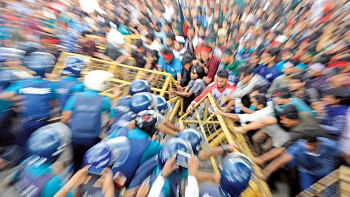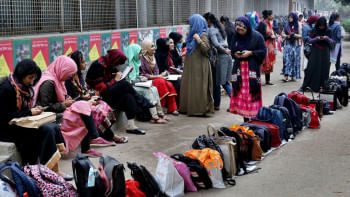Are we failing to understand Gen Z?

The generation of people born from 1995 to 2010 are commonly called Generation Z (Gen Z), following the alphabetical naming of their predecessors two generations prior, Generation X (Gen X). These young people are characteristically blunt and more aware of their rights with regards to what the market or society has to offer. Gen Z has long held a reputation for being attached to the virtual screen. In fact, for most Gen Z parents, screen time has been a growing concern as uncontrolled exposure to media has resulted in a disconnect from reality—or so we thought.
These "screenagers" have held a principal role in the quota reform movement. They have been successful in mobilising the entire nation's student body, the Bangladeshi diaspora, the generational parents and even the rickshaw pullers in fighting for their cause. So, maybe it's for us to take a fresh look at the Gen Z.
These young people have been using social media platforms, most notably Instagram, TikTok and YouTube from a much earlier age than their previous generations. In fact, 58 percent of surveyed teenagers expressed that they could not stay more than four hours without the internet, while older generations can stay up to 24 hours. This statistic makes internet reliance seem like a weakness for Gen Z, but upon close examination, the habits developed out of this excessive rate of internet usage can be appreciated. With the advent of social media and the generation that has adapted to it, discourse has increased, alongside awareness. This is important because, unlike previous generations, Gen Z uses the internet as a bidirectional platform, where you not only consume but also create. They use this bidirectionality to their advantage by promoting their chosen narrative.
The ability to quickly create content that caters directly to their chosen audience was once a skill that only marketing professionals had. The rise of TikTok and Instagram reels has transferred this skill to every Gen Z member with a mobile phone. Gen Z Bangladeshis have used this specific ability to draw attention to their campaign and bring in international actors to the discourse. Their growing familiarity with internet resources allows them to find relevant contacts, write relevant emails and generate responses when necessary. Hence, their activism has taken a far different shape and can reverberate throughout the population far quicker than before. They also receive and process information faster, which has both its advantages and disadvantages.
The biggest disadvantage is the creation of echo chambers where like-minded Gen Z come together to support each other and increase the strength of their opinion which is hard to breach. The advantage is that when this opinion becomes incredibly strong, it pours out of the echo chamber and takes the form of a movement like the quota reform movement. The constant access to information not only keeps them informed but also motivates them.
Gen Z has now developed their own form of communication, including new words that remain largely foreign to older generations. This creates a disconnect between them and older generations—including lawmakers, politicians and people in power. But it cannot be avoided that this generation appears to be more informed and more actionable in their own right. So, their concerns surrounding different matters cannot be taken lightly. In fact, their insights might prove to be most useful in future development-related decisions.
Gen Z in Bangladesh and worldwide have expressed deep concerns with regard to issues such as mental health and climate change, both of which need to be taken seriously. They are already mobilising policy discourses on social media through activist groups that create discussion online without requiring a physical organisation or entity. The marketing world and even policymakers across the developed world are increasingly taking cognisance of their emerging choices and priorities. The same should be happening in Bangladesh.
This generation also has a fresh take on established ideas, such as creating work-space cafes to motivate student's learning which can take on conglomerates such as leading coffee chains in the near future. Their predominantly risk-taking nature has allowed them to introduce upcycling and thrifting culture in Bangladesh, which was previously unheard of in the country. Most notably, this risk-taking nature is not simply a characteristic that fades as the generation ages, which is more apparent than ever. In fact, backed by experience and good judgement, their ideas are worthwhile investments.
Mamun Rashid is chairman at Financial Excellence Ltd.
Views expressed in this article are the author's own.
Follow The Daily Star Opinion on Facebook for the latest opinions, commentaries and analyses by experts and professionals. To contribute your article or letter to The Daily Star Opinion, see our guidelines for submission.

 For all latest news, follow The Daily Star's Google News channel.
For all latest news, follow The Daily Star's Google News channel. 






Comments